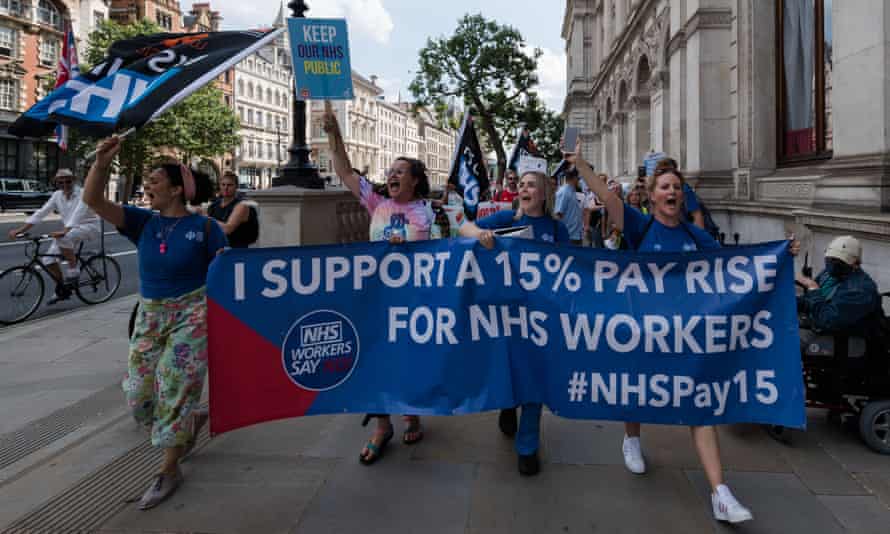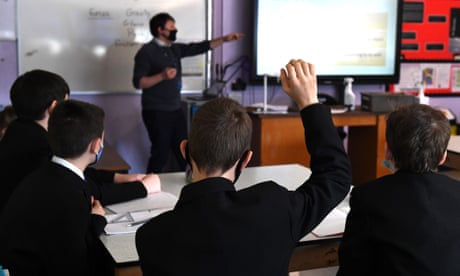Latest NHS salary plan fails to offset past drop, as teachers and police furious at wage freeze

NHS staff, trade union members and health campaigners protest about pay on July 20 in Whitehall. Photograph: Barcroft Media/Getty
Toby Helm
Sun 25 Jul 2021
Toby Helm
Sun 25 Jul 2021
THE GUARDIAN
Pay for nurses and other NHS staff in England will have fallen in real terms by more than 7% since 2010, even if they accept the latest offer from the government, according to new analysis that will fuel rising anger about public sector pay deals.
Figures produced by the TUC show that remuneration for nurses, community nurses, medical secretaries, speech therapists, physiotherapists, paramedics and radiographers will have dropped by between 7.3% and 7.6% in real terms in just over a decade, even after factoring in the 3% rise offered last week.
The Royal College of Nursing, which represents 450,000 nurses, is to consult its members next month for their views on the offer and, if they are overwhelmingly negative, may proceed to an “indicative ballot”, opening up the possibility of some form of industrial action. A senior RCN source said that while this was a remote possibility, it was “not completely off the table”.
The 3% offer for NHS workers was an improvement on an initial figure of just 1% submitted by ministers to the NHS pay review body. But it still caused dismay among many workers who believe their role in fighting the Covid-19 pandemic deserves more.
Last week, unions representing teachers also reacted with fury after it was announced that pay for most of their members would be frozen, while the Police Federation of England and Wales said it no longer had confidence in the home secretary, Priti Patel, after she announced their pay would also be frozen.
The issue of public-sector pay is now building into a political headache for the government, as ministers face up to the huge costs of the pandemic, and look for savings across departmental budgets.
The TUC general secretary, Frances O’Grady, told the Observer: “It’s easy to understand the anger from NHS staff when you see what’s been done to their pay. It’s not just about the 3% – it’s the way their wages have been held back year after year.
“All our key workers deserve a decent standard of living for their family. But too often their hard work does not pay. And after the hardest year of their working lives, they deserve better.
“The prime minster must follow through on his promise to ‘build back fairer’ with fair pay for all key workers. It’s not only about valuing them properly. The spending boost from pay rises will help our businesses and high streets recover faster. It’s the fuel in the tank that our economy needs.”
The Institute for Fiscal Studies (IFS) last week highlighted how the decision on teachers’ pay went back on previous pledges from ministers, and risked damaging recruitment into the profession. The IFS said: “At the last election, the Conservative party manifesto committed to increasing teacher starting salaries in England to £30,000 per year by September 2022.

Pay freeze for England’s teachers a ‘slap in the face’, say unions
“However, to ease pressure on school budgets and the public finances, the government has now announced a freeze on teacher pay levels in England for September 2021, and pushed back starting salaries of £30,000 to September 2023.
“The level of teacher pay is important. It plays a big part in determining the recruitment and retention pressures faced by schools. With the cost of employing teachers accounting for over half of school spending, what happens to salary levels also has a large bearing on the overall resource pressures faced by schools. And it is a key determinant of material living standards for over 500,000 teachers in England.”
Geoff Barton, general secretary of the Association of School and College Leaders, said: “Following a year in which teachers and leaders have worked flat out on managing a battery of Covid control measures, as well as assessing students following the government’s decision to cancel public exams, the decision to implement a pay freeze is an absolute insult.”
Pay for nurses and other NHS staff in England will have fallen in real terms by more than 7% since 2010, even if they accept the latest offer from the government, according to new analysis that will fuel rising anger about public sector pay deals.
Figures produced by the TUC show that remuneration for nurses, community nurses, medical secretaries, speech therapists, physiotherapists, paramedics and radiographers will have dropped by between 7.3% and 7.6% in real terms in just over a decade, even after factoring in the 3% rise offered last week.
The Royal College of Nursing, which represents 450,000 nurses, is to consult its members next month for their views on the offer and, if they are overwhelmingly negative, may proceed to an “indicative ballot”, opening up the possibility of some form of industrial action. A senior RCN source said that while this was a remote possibility, it was “not completely off the table”.
The 3% offer for NHS workers was an improvement on an initial figure of just 1% submitted by ministers to the NHS pay review body. But it still caused dismay among many workers who believe their role in fighting the Covid-19 pandemic deserves more.
Last week, unions representing teachers also reacted with fury after it was announced that pay for most of their members would be frozen, while the Police Federation of England and Wales said it no longer had confidence in the home secretary, Priti Patel, after she announced their pay would also be frozen.
The issue of public-sector pay is now building into a political headache for the government, as ministers face up to the huge costs of the pandemic, and look for savings across departmental budgets.
The TUC general secretary, Frances O’Grady, told the Observer: “It’s easy to understand the anger from NHS staff when you see what’s been done to their pay. It’s not just about the 3% – it’s the way their wages have been held back year after year.
“All our key workers deserve a decent standard of living for their family. But too often their hard work does not pay. And after the hardest year of their working lives, they deserve better.
“The prime minster must follow through on his promise to ‘build back fairer’ with fair pay for all key workers. It’s not only about valuing them properly. The spending boost from pay rises will help our businesses and high streets recover faster. It’s the fuel in the tank that our economy needs.”
The Institute for Fiscal Studies (IFS) last week highlighted how the decision on teachers’ pay went back on previous pledges from ministers, and risked damaging recruitment into the profession. The IFS said: “At the last election, the Conservative party manifesto committed to increasing teacher starting salaries in England to £30,000 per year by September 2022.

Pay freeze for England’s teachers a ‘slap in the face’, say unions
“However, to ease pressure on school budgets and the public finances, the government has now announced a freeze on teacher pay levels in England for September 2021, and pushed back starting salaries of £30,000 to September 2023.
“The level of teacher pay is important. It plays a big part in determining the recruitment and retention pressures faced by schools. With the cost of employing teachers accounting for over half of school spending, what happens to salary levels also has a large bearing on the overall resource pressures faced by schools. And it is a key determinant of material living standards for over 500,000 teachers in England.”
Geoff Barton, general secretary of the Association of School and College Leaders, said: “Following a year in which teachers and leaders have worked flat out on managing a battery of Covid control measures, as well as assessing students following the government’s decision to cancel public exams, the decision to implement a pay freeze is an absolute insult.”
No comments:
Post a Comment